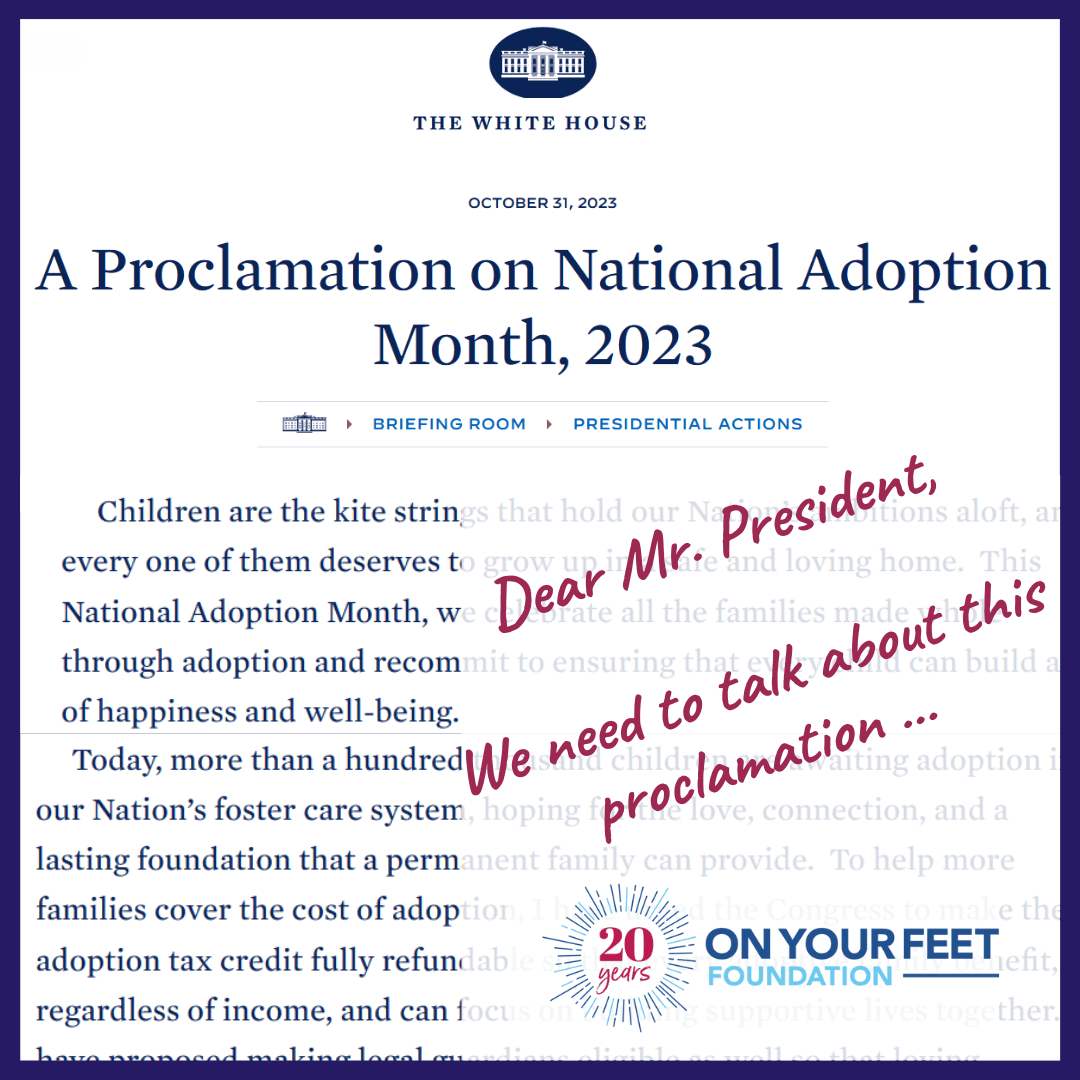
We were stunned to read this year's National Adoption Awareness Month proclamation, in which adoption is celebrated but birthparents are never mentioned, mirroring how invisible birthparents are in the adoption landscape, and we were disappointed with the discussion within this proclamation that calls for growing the Adoption Tax Credit to benefit a more expansive group of potential adoptive parents and guardians, but does not mention the need to create and expand support and services aimed at family preservation. As a fierce and tireless advocate for birthparents, and never one to stay quiet in the face of injustice, we are closing out National Adoption Awareness Month, by sharing the letter that On Your Feet Foundation Executive Director Alexis Eyler sent to the President a few weeks ago, to better educate him on adoption and to point out how problematic this proclamation is.
Dear Mr. President,
I am writing to you regarding The White House Proclamation on National Adoption Month (NAAM). I have spent the last eight years running an organization that provides post-placement services to birthparents. Founded in 2001, On Your Feet Foundation is the only independent (not tied to an adoption agency) non-profit organization in the country providing comprehensive support to individuals who placed a child for adoption, no matter when or how that placement occurred. Providing a neutral option for post-placement support for birthparents is critical because many, if not most, birthparents will not seek support from the agency that aided in their adoption due to the trauma of the placement. In fact, there is no federal mandate for post-placement care – whether through an agency or through independent providers such as On Your Feet Foundation. I will also point out that there is no state or federal support for our work. We are almost entirely funded through individual donations, and our services are offered at no cost to birthparents.
While the original intent behind NAAM may be altruistic, today, it fails to acknowledge the trauma caused by adoption. NAAM also does not recognize the challenges faced by birthparents following placement. In fact, the White House Proclamation does not mention birthparents a single time, which is a fundamental part of the problem with NAAM and adoption. Birthparents have been and continue to be an invisible part of the adoption constellation because for us to see them would require us to acknowledge that in order to create a family through adoption, we first have to break another family apart. In fact, birthparents are the least studied, understood, and served members of the adoption constellation.
Birthparents face so many challenges after placement, from undiagnosed PMAD, because that is something typically diagnosed by a pediatrician, to the loss of their support systems, compounding the disenfranchised grief, a term coined by Dr. Kenneth Doka, that they experience, which can and often does last a lifetime. In fact, NAAM has served to erase the hard truths of adoption, leaving many adoptees and birthparents feeling silenced, instead celebrating adoption and adoptive parents.
The outcomes for adoptees, who are studied, are disturbing:
- The odds of a reported suicide attempt are ∼4 times greater in adoptees compared with non-adoptees.
- 12-14% of adopted children in the United States between the ages of 8 and 18 are diagnosed with a mental health disorder each year, and adopted children are almost twice as likely as children brought up with their biological parents to suffer from mood disorders like anxiety, depression, and behavioral issues.
- 1/3 of adolescents referred for psychotherapy are adopted.
- Children of adoption are inherently at a higher addiction risk due to adoptive status alone, and additional trauma (abuse, PTSD from family separation) amplifies this risk further.
- Adoptees are overrepresented in the juvenile criminal system, prison system, psychiatric institutions, and drug and alcohol rehabilitation settings.
Until we stop ignoring the trauma that comes along with every adoption, we will continue to see outcomes that include increased risk of mental health disorders, suicide, and substance use/abuse - and these outcomes are mirrored in birthparents.
When hopeful adoptive families can access grants and fundraise thousands of dollars in order to adopt a child, but a woman who finds herself in a crisis pregnancy can’t access the resources needed so that she can parent, when our government expands benefits and tax credits for adoptive families, but can’t provide sufficient resources so that a family can stay together, something is wrong. Particularly in a post-Roe world, failure to acknowledge the challenges of adoption is disingenuous to the women and children whom it impacts the most. Those advocating for the dismantling of Roe touted adoption as the solution, yet 90% of women denied an abortion choose to parent. Denying abortion access does not equate to an increase in adoptions. It results in an increase in the number of parents trying to parent without the resources they need to do so.
NAAM needs to acknowledge that adoption begins with separation and loss and that, for many adoptees and birthparents, it is not something to be celebrated. NAAM should be refocused to center the voices of adoptees and birthparents. We need to listen and learn from them. And we need to provide the resources so that a woman can choose to parent her child. Finally, for adoptees and birthparents, we need to provide better adoption education and access to mental health resources in order to improve outcomes for those most impacted by adoption.
I would be honored to have the opportunity to discuss the full impact of adoption on birthparents and adoptees with you or any member of your staff. I appreciate your time and consideration. Thank you.
Respectfully,
Alexis Eyler (she/her)
Executive Director, On Your Feet Foundation











